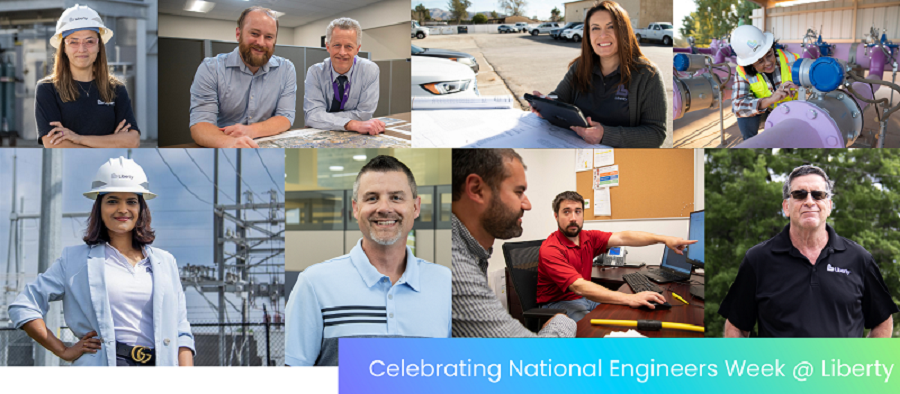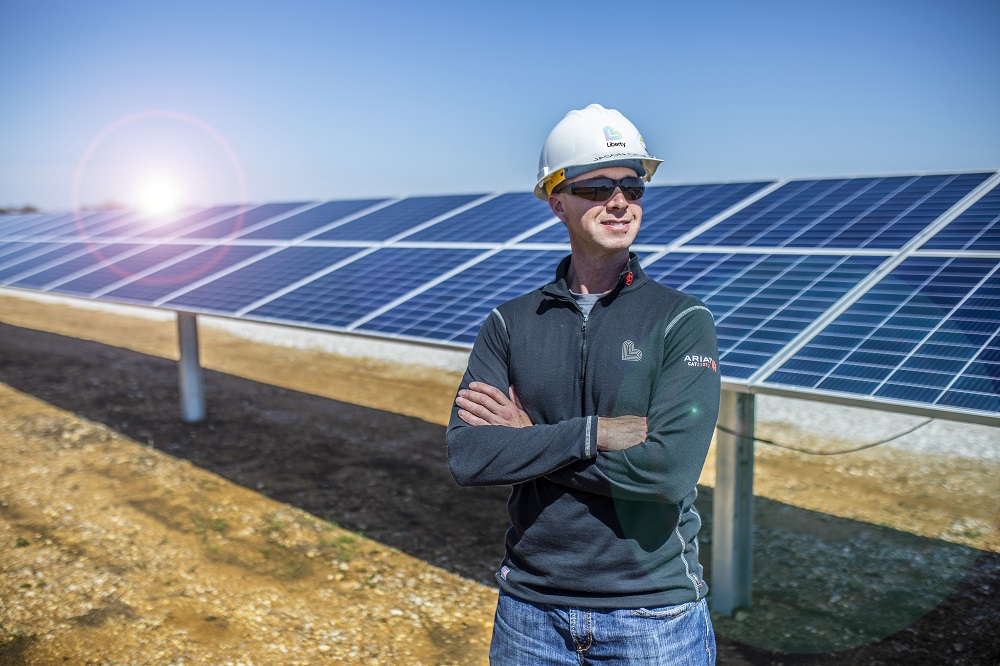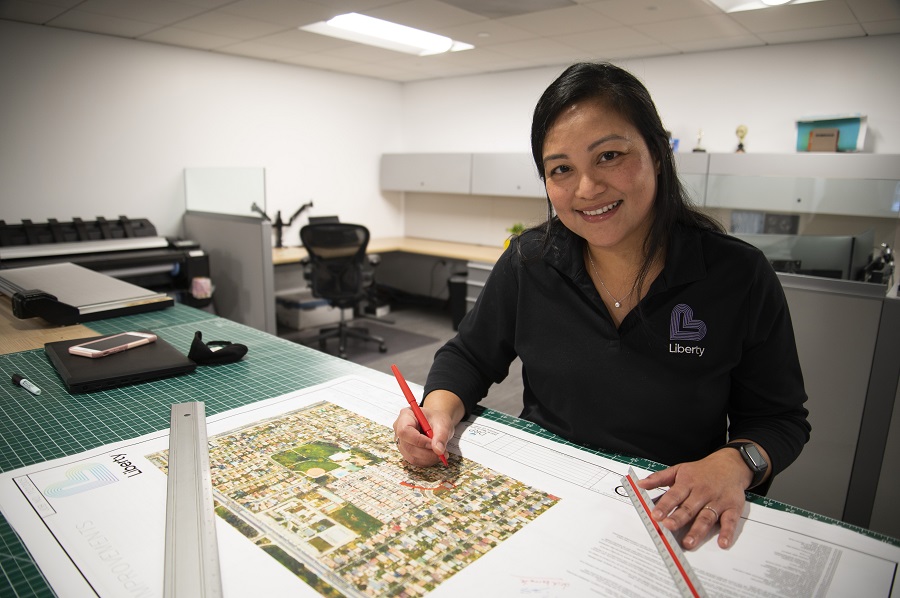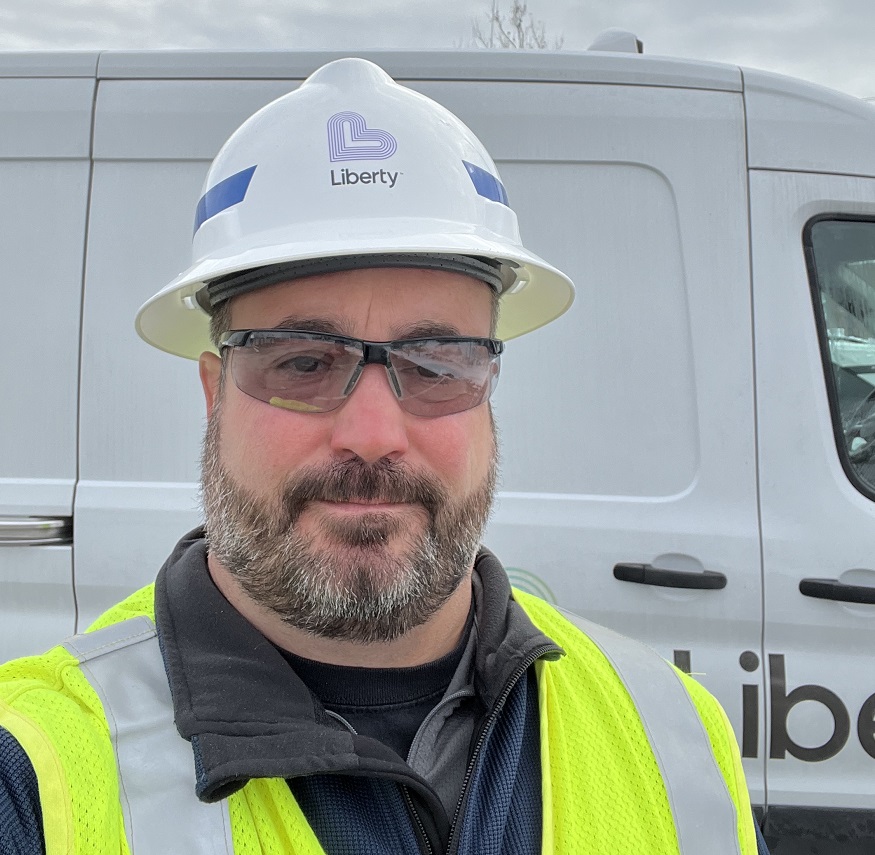
Beyond a penchant for math and science, ask about the earliest foundations of their careers and you’ll find there are wildly different paths that led our dedicated engineering professionals to Liberty.
For Jason Osiek, it was taking apart his toys to see what made them tick; for Joshua Crawford, it was the possibilities of nuclear power. Janelle Rellosa says it was a desire to help the environment, while Nick Saccone says dirt bikes and stock cars helped blaze his career trail.
For National Engineers Week (observed this year from Feb. 16-22), we’d like you to join us in celebrating our engineers. No matter how they got their start, they share one central passion – delivering safe, reliable service to our electric, water, and gas customers by maintaining and improving our systems and infrastructure.
To the problem-solvers and innovators who make the impossible possible, thank you and happy Engineers Week!

Jason Osiek
Director of Engineering – Joplin, Missouri
As a child, Jason Osiek had an interest in how his toys worked – whether it was a radio-controlled car or a robot.
“A lot of expensive toys were dissected as I got them as gifts,” he says. “That was probably one of the first signs (of being a future engineer), along with math and geometry being my favorite subjects while growing up. We didn’t have engineers in the family, but my grandfather was a math teacher. He lived with us in a split-level house, with my parents living upstairs. He had been an architect and studied at (the University of Kansas). That probably helped propagate my interests.”
After studying electrical engineering at Missouri University of Science and Technology, he took an entry-level position with Liberty’s State Line Combined Cycle power plant in Joplin, Missouri. It was a position that allowed him to learn the ins and outs of running what was then a relatively new plant.
In his nearly 22 years with the company, he served as plant operations manager and substation operations project manager. He has designed and built substations and – most recently – the community solar farm in Joplin. In 2022, he was named Director of Engineering.
While not out working in the field as much as he used to, Osiek still has a lot of passion for the job.
“I’m always looking for ways to improve a process,” he says. “Nothing is ever done; you can always continue upgrading and improving. I like being able to share knowledge and field experience with the younger generation of engineers to help better their designs and make them more efficient and cost effective. It’s still exciting to contribute.”

Joshua Crawford
Engineer III – Columbus, Georgia
Though he didn't go into the nuclear-engineering field as he originally intended, Joshua Crawford feels highly enriched by his work with Liberty.
He began working for his grandfather at age 14, building and remodeling houses for more than eight years while nurturing the skills that still serve him well today.
“I was good with my hands and had a good work ethic instilled in me and also had very good grades in STEM subjects,” Crawford says.
While he says he could have just as easily taken over the family construction business, he decided to study engineering at Kennesaw State University. While exploring his options within the university’s engineering program, he became interested in nuclear engineering.
“Everybody wants a cleaner future,” Crawford says. “With nuclear, there’s very minimal waste or carbon footprint. The head of the department was a renowned engineer in the industry … he could have been a great football coach because he got you pumped up about being in the nuclear industry. But I learned that while I’m a big proponent of nuclear energy it’s a slow-paced industry and there’s a lot of red tape. It’s going to be many years before it becomes standard.”
After graduation, he took a project engineer position with one of the largest gas utilities in the state before joining Liberty as an engineer in June 2024. His work has included small main extensions to projects involving businesses and housing developments.
“Whether it’s electricity, water, or gas, utility work has an immediate effect for the general populous,” says Crawford. “In the nuclear field, you may go your entire career working on one project. We’re downstream but still part of the same industry, but on a more personal scale.”
For the next generation of future engineers, he suggests “getting your hands dirty” as early as possible.
“Even after graduating from engineering school, look at getting a hands-on position first,” he says. “It will create more awareness and knowledge about the day-to-day operations of the area you want to go in. The skills you learn will stick with you.”

Janelle Rellosa
Manager, Engineering Projects – Downey, California
Janelle Rellosa works 13 miles southeast of downtown Los Angeles … out of the path of the wildfires that have ravaged Southern California, though she had family members who were close enough that they were preparing to evacuate if necessary.
“I was involved with checking social media statements that didn’t sound right … from claims that fire hydrants were drying up or water from reservoirs not being available,” she says. “Disinformation can spread so quickly. I learned it’s very important to communicate with our customers and educate them about how our water system works and what our goals are.”
Water, and the critical role it plays in the environment, is central to her position with Liberty.
Rellosa says that while she was good at science and math, engineering wasn’t really on her radar during high school until a teacher mentioned a family member becoming an environmental engineer.
“I thought that was interesting, because I wanted to do something that would help the environment,” she says. “It stuck with me and when I started to fill out college applications, it was an option.”
After graduating with her degree in environmental engineering, she took a civil engineer position with the Park Water Company, which would later be aquired by Liberty.
“This was my first job after graduation, and I’ve been here for 23 years this coming September,” she says. “I’ve grown up with Liberty.”
While a large percentage of projects she has been a part of have been water main replacements, Rellosa says she has also worked on the creation of a new well and construction of a new reservoir.
“When you get involved as an engineer, you’re a part of it from the very beginning to the very end,” Rellosa says. “You start a job with planning, budgeting, getting approvals, and permits from different agencies. Then there’s the actual construction, working with contractors out in the field, and then with the finance team to close completed projects. We all work together, and I enjoy that part of the job.”

Nick Saccone
Senior Manager of Capital Construction – Massachusetts
Nick Saccone felt the need … the need for speed. At a young age, he had a passion for racing; first dirt bikes and later stock cars.
“I liked the adrenaline rush, and racing was a way to facilitate that,” he says. “It was mainly cars and the geometry of racetracks. I wanted to know what I was doing and why.”
He initially considered jobs working on snowmobiles or ATVs, but his fascination with how things work eventually led him into the engineering field after starting his career as an electrician.
“As a technician, you did everything,” Saccone says. “The engineering piece came into play doing hydraulic modeling – what we now call synergy modeling – of the entire gas distribution system.
Today, he serves as Liberty’s Senior Manager of Capital Construction in Massachusetts. He says he enjoys the people he works with and being in tune with all aspects of a construction project.
“It’s really cool to see a gas system that’s well over 100 years old being modernized,” Saccone says.
While his racing days are in the past, he still finds ways to put those early passions to good use.
“I still have a snowmobile and I’m working on rebuilding a 1995 (Ford) Bronco,” he says.

